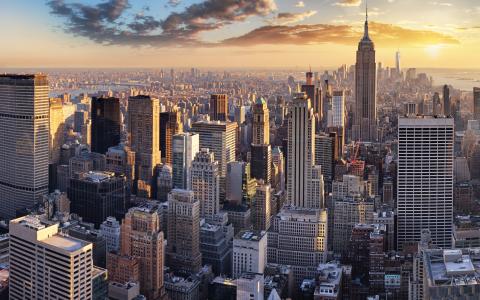
Companies are racing to public markets like never before, cashing in on record-high stock prices.
An all-time high of almost $350 billion has been raised in initial public offerings in the first six months of this year, according to data compiled by Bloomberg, surpassing the previous peak of $282 billion from the second half of 2020 and enriching entrepreneurs and bankers alike.
When the rush for IPOs kicked off last year, stay-at-home technology dominated the scene, seizing on investor interest in anything digital, while special-purpose acquisition companies also flooded the market. This year, with stocks continuing to push skyward, the trend has broadened to include renewable-energy companies and online retailers.
Everyone from Swedish oat-milk company Oatly Group AB to bootmaker Dr. Martens Plc sold shares in 2021. Still, tech accounts for a big chunk of the deals. Didi Global Inc. will rank among the biggest U.S. IPOs of the past decade if the Chinese ride-hailing giant carries through with plans to sell as much as $4 billion in stock.
“The markets from New York to Hong Kong were on fire in the first half of this year and have left even the late 90s dotcom boom era in the rearview mirror,” said Aaron Arth, head of the financing group at Goldman Sachs Group Inc. in Asia ex-Japan.
The boom has been fueled by a torrent of cash that central banks have pumped into the economy and the rise of individual investors, who are eager to buy a piece of their favorite companies.
It’s delivered a windfall for investment banks around the world, who reap the rewards from underwriting and advisory fees. Goldman and Citigroup Inc. rank Nos. 1 and 2 in the global league tables for IPOs this year.
With so many companies rushing to market, the industry is starting to look saturated. Investors say they can afford to be picky and are increasingly reluctant to pay steep valuations demanded by the fast-growing companies that populate the IPO market.
As a result, a number of high-profile stocks have stumbled in their trading debuts this year and some companies are getting spooked. Food-delivery startup Deliveroo Plc plunged 26% on its first day of trading in London, while Oscar Health Inc., the insurance startup co-founded by Josh Kushner, has fallen 40% since joining the New York market.
Russia’s Nord Gold Plc on Tuesday pulled its IPO, citing market uncertainty and swings in the gold price, while Genworth Financial Inc. last month postponed a U.S. offering for its Enact Holdings Inc. mortgage-insurance unit. And Friday, Hong Kong-traded Geely Automobile Holdings Ltd. withdrew its application for a listing in Shanghai.
“There has been a certain level of exhaustion among investors and increased selectivity,” said Saadi Soudavar, co-head of equity capital markets for Europe, the Middle East and Africa at Deutsche Bank AG. “It’s a record year after all, so they can have their pick among the multiple transactions coming their way.”
Investor appetite for one type of listing has already faded. SPACs accounted for almost half the proceeds raised in the IPO market in the first quarter, but their share shrunk to about 13% this quarter.
An index that tracks SPAC listings has dropped 23% from a February high. The poor performance, along with tougher regulatory scrutiny has been a blow to market sentiment. U.S. officials have cautioned individual investors against celebrity-endorsed cash shells and are scrutinizing accounting practices.
Still, as long as the stock market is rising, the flow of IPOs is unlikely to dry up, and total proceeds this year are on track to eclipse the record of $420.1 billion set in 2007. The IPO boom will likely continue for the next six to 12 months, said Rob Leach, European head of equity capital markets at Jefferies Financial Group Inc.
Trading app Robinhood Markets Inc. has a U.S. offering in the works, while cloud-storage company OVHCloud plans to list in France and Volvo Cars is considering an IPO in Sweden. In the Middle East, Al Yah Satellite Communications Co. is also planning to list in what would be the first IPO on Abu Dhabi’s stock exchange since 2017.
“There is a degree of uncertainty about how long the party will keep going, but we expect to see a very busy third-quarter,” with a big pipeline of companies lining up to list after the summer, said Deutsche Bank’s Soudavar.
This article originally appeared on Yahoo! Finance.



